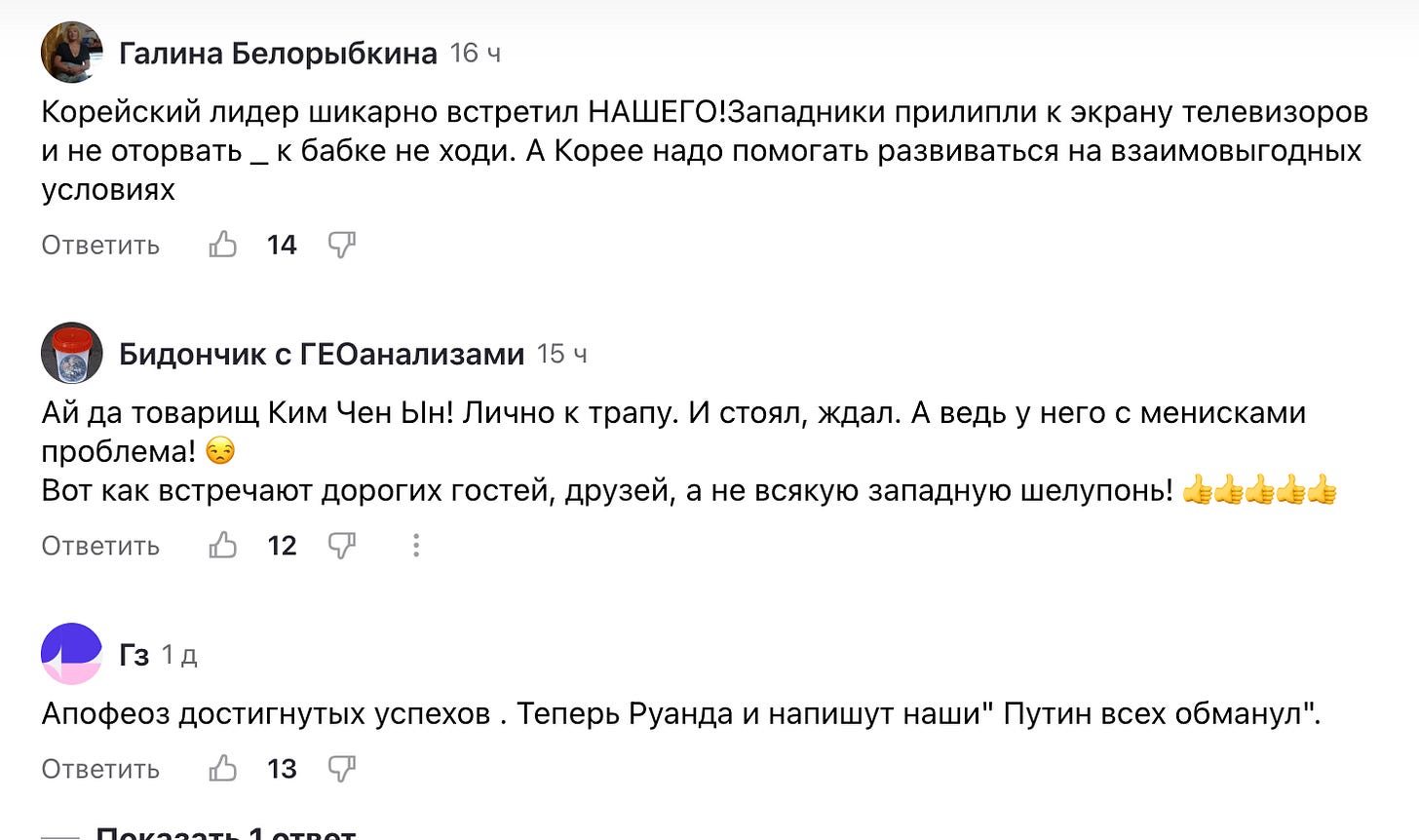Russia's imperialist narrative resonates in Asia
The Russian President's visit to North Korea shows desperation while triggering warnings for NATO to broaden its messaging strategy.
Executive Summary: To counter Russia's influence campaigns in Asia more effectively, the NATO Allies must incorporate cultural identity aspects into their messaging strategy. Russia's trade, energy, and defense agreements in Asia have significant social components. Without addressing these, the Russian Federation's narrative of Russia vs. the West could dominate politically and socially in parts of Asia. To effectively counter Russia's narratives, NATO must consider cultural and ideological ties in Asia, addressing anti-imperialist sentiments and the historical influence of Soviet-era Russian culture.
Symbolism in Mr. Putin's Visit to North Korea
Vladimir Putin's visit to see Kim Jong-un in Pyongyang on June 18th ended with a symbolic close moment: Kim Jong-un guided Mr. Putin into a hug, a gesture he usually avoids, showing a mix of desperation and friendliness. This interaction highlights North Korea's reliance on its relationship with Russia through a formal agreement to partner on the economy, energy, transport, and engagement for defense.
North Korea's streets are typically marked by mandatory state activities, music and empty streets except for staged tourists trips. However, citizens with rare Internet access report to journalists accounts of empty buildings, fake villages, poverty, famine, and illness. While Mr. Putin needs the missiles and leverage that Kim Jong-un has to offer, the DPRK is in rough shape.
That is why last year’s surge in Russian-language content praising North Korea caught my attention. It showcased the DPRK’s social and economic prowess as well as Kim Jong-un's communist success story and benevolence. The contrary reality of the content was an indicator that more official engagement was brewing behind closed doors.
This genre of content aims to build public support for Russian-North Korean partnerships and agreements, revealing premeditated intentions by both governments. When such engagements occur, the target audience, especially Russian-speaking people, are more likely to view them positively as a result of targeted messaging.
The Broader Implications of Russian-North Korean Engagements
The economic and trade connections between Russia, the DPRK, and the PRC are evident to some of the Russian public. Social media content, some generated by AI, portrays a mix of supportive and critical views, with positive sentiments often outweighing the negative. Despite being accustomed to propaganda, the Russian public's reaction to North Korea is not overwhelmingly skeptical, influenced by cultural and ideological ties, and the previous year’s messaging strategies on social media.
Other commentators noted the practically of the arrangement: the positive dialogue is a result of Russia’s need for North Korea’s weapons. Another subscriber commented that President Putin has body doubles, since the real one no longer exists. To which, someone else posted a meme dragging both Ukrainians and Vladimir Putin.

Thick data analysis reveals the impact of culturally-driven messaging. There are avid supporters who are proud of the extravagant North Korean reception to the Russian President. While others compliment their communist brethren as “tovarisch/товарищ”. The content referenced below relates to Russian-speaking people, but it represents broader cultural themes of Russia’s messaging strategy in Asia.
Russian Social Media Posts



Russia's Messaging Strategy in the Pacific
Some Russians view their country, leader, and themselves as fundamentally communist in mentality and Eurasian, ideological and ethnic points that shape the Russian Federation's narrative of Russia vs. the West in Asia. The Russian Federation portrays itself as a victim of Western imperialism while positioning itself as a helper to Asian nations previously assisted by the Soviet Union and Imperial Russia against Western nations. President Putin's references to U.S. and NATO measures as imperialistic resonate in Asia, justifying Russia's defense partnerships with North Korea.
Despite North Korea's limited economic value, it offers Mr. Putin leverage over the U.S. in the Pacific. Russia's relationships with China, India, and in Southeast Asia are crucial to its strategy in Asia against NATO’s support for Ukraine. The Russian President’s visit to Vietnam, where Vietnamese President To Lam referred to Vladimir Putin as comrade, signals an attempt to revive communist solidarity through initiatives in nuclear energy and academic endeavors. Public support for Russia, based on cultural history and tourism, is evident in other parts of Asia, including Thailand and India where Russia receives positive popular perceptions.
Enhancing NATO Allies’ Messaging Strategy
To counter Russia's narratives in Asia, the NATO Allies must address the cultural and ideological bonds that underpin Russia's political relationships in Asia. This involves political and public views on anti-imperialist attitudes, appreciation of Soviet-era Russian culture, Russian business and tourism, and collectivist sentiments that persist in several Asian nations. By accounting for these factors, NATO can better counteract Russia's moves to strengthen its control over Ukraine and its influence in Asia.
NATO's messaging strategy must consider the cultural nuances to counter Russia's influence more broadly in Asia. Recognizing and addressing the cultural pushback against some Western nations and the anti-imperialist narratives promoted by Russia will be crucial for success.
~E
Gray Truths©️2024







Your analysis offers a 3-dimensional analysis. Thank you. Also, the reference to "body doubles" was interesting. Is this an example of Russian conspiracy theory?